I'm researching the origins of the term, "Check six!" Excepting the title of Jim Curran's book of the same name, I've never come across contemporaneous accounts from World War II that used this term. In other words, no one I interviewed, no letter I've read, no diary, no unit after action report, etc., has ever used this term.
It makes sense that they would have used it as part of the clock code, but again, I've never seen it. I suspect that it came into use later, but I don't have any evidence upon which to base this.
Any ideas?
Thanks,
Guinness
It makes sense that they would have used it as part of the clock code, but again, I've never seen it. I suspect that it came into use later, but I don't have any evidence upon which to base this.
Any ideas?
Thanks,
Guinness

